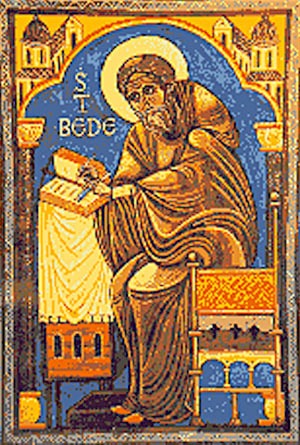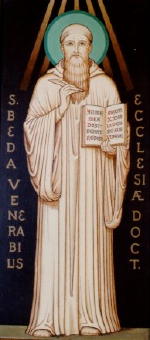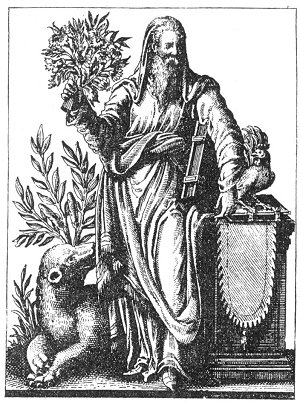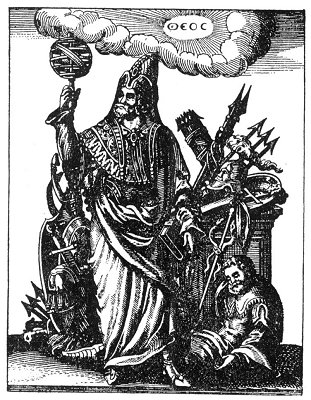The letter in which he declines Egbert’s invitation on the plea of illness is dated November, 734. If we may assume that his death took place on the eve of Ascension Day in 735, no long period of enfeebled health clouded the close of his life, and weakness never interrupted his work. His death has been described by his pupil, Cuthbert, who afterwards became Abbot of Wearmouth and Jarrow in succession to Huaetbert, in the letter quoted below. He was first buried at Jarrow but, according to Simeon of Durham, his relics were stolen by the priest, Elfred, and carried to Durham. In 1104, when the bones of Cuthbert were translated to the new Cathedral, those of Bede were found with them. Not long after, Hugh de Puisac erected a shrine of gold and silver, adorned with jewels, in which he placed them, along with the relics of many other saints. The shrine disappeared at the Reformation, and only the stone on which it rested remains.
Letter of Cuthbert to Cuthwin.
“To his fellow-lector, Cuthwin, beloved in Christ, Cuthbert, his fellow-student, greeting and salvation for ever in the Lord. I have very gladly received the gift which thou sentest to me, and with much joy have read thy devout and learned letter, wherein I found that which I greatly desired, to wit, that masses and holy prayers are diligently offered by you for our father and master Bede, beloved of God. Wherefore I rejoice, rather for love of him than from confidence in my own power, to relate in few words after what manner he departed out of this world, understanding also that thou hast desired and asked this of me. He was troubled with weakness and chiefly with difficulty in breathing, yet almost without pain, for about a fortnight before the day of our Lord’s Resurrection; and thus he afterwards passed his time, cheerful and rejoicing, giving thanks to Almighty God every day and night, nay, every hour, till the day of our Lord’s Ascension, to wit, the twenty-sixth day of May, and daily gave lessons to us, his disciples; and whatsoever remained of the day he spent in singing psalms, as far as he was able; he also strove to pass all the night joyfully in prayer and thanksgiving to God, save only when a short sleep prevented it; and then he no sooner awoke than he straightway began again to repeat the well-known sacred songs, and ceased not to give thanks to God with uplifted hands. I declare with truth that I have never seen with my eyes, or heard with my ears, any man so earnest in giving thanks to the living God. O truly blessed man! He repeated the words of St. Paul the Apostle, ‘It is a fearful thing to fall into the hands of the living God,’ and much more out of Holy Scripture; wherein also he admonished us to think of our last hour, and to arise out of the sleep of the soul; and being learned in our native poetry, he said also in our tongue, concerning the dread parting of souls from the body:
Fore then neidfaerae naenig uiuurthit thonc suotturra than him tharf sie to ymb hycggannae aer his hin iongae huaet his gastae godaes aeththa yflaes aefter deothdaege doemid uueorthae.
Which being interpreted is: ‘Before the inevitable journey hence, no man is wiser than is needful that he may consider, ere the soul departs, what good or evil it hath done and how it shall be judged after its departure.’
“He also sang antiphons for our comfort and his own. One of these is, ‘O King of Glory, Lord of all power, Who, triumphing this day, didst ascend above all the heavens, leave us not comfortless, but send to us the promise of the Father, even the Spirit of Truth—Hallelujah.’ And when he came to the words, ‘leave us not comfortless,’ he burst into tears and wept much. And an hour after, he fell to repeating what he had begun. And this he did the whole day, and we, hearing it, mourned with him and wept. Now we read and now we lamented, nay, we wept even as we read. In such rapture we passed the fifty days’ festival till the aforesaid day; and he rejoiced greatly and gave God thanks, because he had been accounted worthy to suffer such weakness. And he often said, ‘God scourgeth every son whom He receiveth; and the words of St. Ambrose, ‘I have not so lived as to be ashamed to live among you; but neither do I fear to die, because we have a merciful Lord.’ And during those days, besides the lessons we had daily from him, and the singing of the Psalms, there were two memorable works, which he strove to finish; to wit, his translation of the Gospel of St. John, from the beginning, as far as the words, ‘But what are they among so many?’ into our own tongue, for the benefit of the Church of God; and some selections from the books of Bishop Isidore, saying, ‘I would not have my boys read a lie, nor labour herein without profit after my death.’

Moe is the founder of GnosticWarrior.com. He is a father, husband, author, martial arts black belt, and an expert in Gnosticism, the occult, and esotericism.







